 Petzlover
Petzlover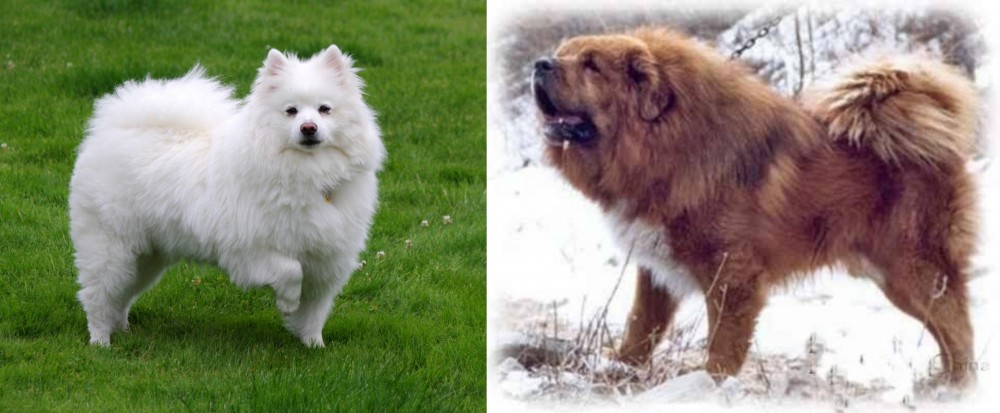 American Eskimo Dog is originated from United States but Tibetan Kyi Apso is originated from China. American Eskimo Dog may grow 23 cm / 9 inches shorter than Tibetan Kyi Apso. American Eskimo Dog may weigh 29 kg / 63 pounds lesser than Tibetan Kyi Apso. Both American Eskimo Dog and Tibetan Kyi Apso has almost same life span. Both American Eskimo Dog and Tibetan Kyi Apso has almost same litter size. American Eskimo Dog requires High Maintenance. But Tibetan Kyi Apso requires Moderate Maintenance
American Eskimo Dog is originated from United States but Tibetan Kyi Apso is originated from China. American Eskimo Dog may grow 23 cm / 9 inches shorter than Tibetan Kyi Apso. American Eskimo Dog may weigh 29 kg / 63 pounds lesser than Tibetan Kyi Apso. Both American Eskimo Dog and Tibetan Kyi Apso has almost same life span. Both American Eskimo Dog and Tibetan Kyi Apso has almost same litter size. American Eskimo Dog requires High Maintenance. But Tibetan Kyi Apso requires Moderate Maintenance
 The American Eskimo is derived from the Nordic Spitz breed and most closely related to the German Spitz in particular. There were many German Spitzes in the United States at the time of the second World War and anti-German sentiment caused its name to change to the American Eskimo Dog. However, as the breed developed over time in the States, the American Eskimo became its own separate breed. In addition to the German Spitz, the American Eskimo is also related to the white Keeshond, the Samoyed, the white Italian Spitz and the white Pomeranian.
The history is beginning to show that the Spitzes that were brought to the US in the early 1900’s was white. This color was not popular in Europe but was quickly the favorite in the United States. They were originally working dogs on farms and ranches. They have excellent herding instincts, make goo watch and guard dogs, and good law enforcement sniff dogs. However, their first introduction to the American public was through the Cooper Brothers’ Railroad Circus and Stout’s Pal Pierre at the Barnum and Baily Circus. Eskimo puppies were sold after the circus show.
The American Eskimo is derived from the Nordic Spitz breed and most closely related to the German Spitz in particular. There were many German Spitzes in the United States at the time of the second World War and anti-German sentiment caused its name to change to the American Eskimo Dog. However, as the breed developed over time in the States, the American Eskimo became its own separate breed. In addition to the German Spitz, the American Eskimo is also related to the white Keeshond, the Samoyed, the white Italian Spitz and the white Pomeranian.
The history is beginning to show that the Spitzes that were brought to the US in the early 1900’s was white. This color was not popular in Europe but was quickly the favorite in the United States. They were originally working dogs on farms and ranches. They have excellent herding instincts, make goo watch and guard dogs, and good law enforcement sniff dogs. However, their first introduction to the American public was through the Cooper Brothers’ Railroad Circus and Stout’s Pal Pierre at the Barnum and Baily Circus. Eskimo puppies were sold after the circus show.
It was then that the breed became one of America’s favorite breeds and they quickly became house pets. Following World War II, Japan exported the Japanese Spitz into America and it was crossed with the Eskimo also. The American Eskimo Dog breed was not recognized by AKC until 1985. Still in 1958 there was no official breed club in the States but there were growing numbers of the dogs. It was not until 1970 did the National American Eskimo Dog Association (NAEDA) come into being. They collected the pedigrees of the first 1750 dogs to be AKC registered.
Since the American Eskimo Dog is not recognized internationally, those wishing to participate in international competition such as England’s prestigious Cruft’s Dog Show must register their dogs a German Spitz. Despite this the American Eskimo and German Spitz remain two very different breeds.
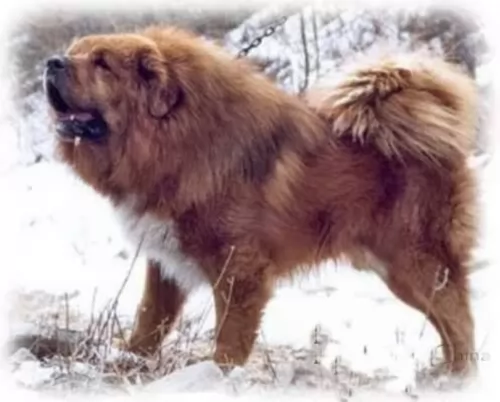 The Tibetan Kyi Apso is an ancient rare breed. In fact, it is one of the rarest breeds on earth. Coming from Tibet, the Kyi Apso guarded livestock and homes for the nomads of the “rooftop of the world”. Apso means bearded and Kyi meand dog thus the Kyi Apso is a bearded dog.
The Tibetan Kyi Apso is an ancient rare breed. In fact, it is one of the rarest breeds on earth. Coming from Tibet, the Kyi Apso guarded livestock and homes for the nomads of the “rooftop of the world”. Apso means bearded and Kyi meand dog thus the Kyi Apso is a bearded dog.
This breed is very intelligent with a great personality and charm. In Western countries the breed is called Apso Do-Kyi or the Tibetan Collie. The first time these dogs are mentioned in any kind of documents was the late 19th and early 20th centuries in writings about Central Asian dogs. The Kyi Apso is related to the Tibetan Mastiff.
The breed is known to have been imported by Captain George Augustus Graham as a Tibetan wolf dog. The dog was also known to be owned by the 13th Dali Lama. There have not been many exported to Europe or North America, with the first coming to North America in the 1970’s.
There have been no registered litters since 2000 and the Tibetan Kyi Apso Club closed in 1999.
 This small to medium dog is beautiful and resembles a miniature Samoyed. There are three sizes of American Eskimo – the standard, miniature, and the toy. The Eskimo’s head is wedge shaped with tall, triangular, erect ears. It has a heavily plumed tail with a sharp curl over the back. The Eskimo can burst into bold action due to their good legs and feet.
This small to medium dog is beautiful and resembles a miniature Samoyed. There are three sizes of American Eskimo – the standard, miniature, and the toy. The Eskimo’s head is wedge shaped with tall, triangular, erect ears. It has a heavily plumed tail with a sharp curl over the back. The Eskimo can burst into bold action due to their good legs and feet.
The coat is a double one with a harsh outer coat and plush inner one. The coat is always white or white with cream or biscuit markings, and visible skin in gray or pink. The American Eskimo’s ruff or mane is very heavy, and the nose, eyelids, pads and gums are black. They have dark eyes and blue are not allowed.
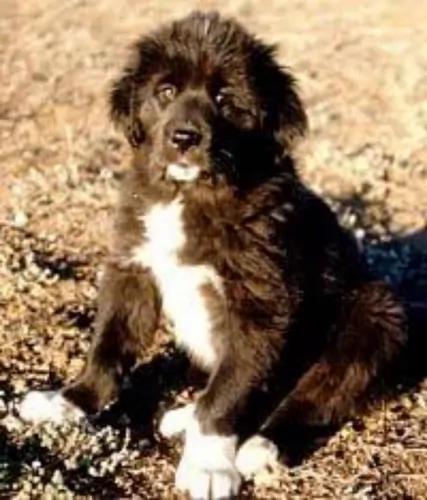 The Tibetan Kyi Apso is a large dog with a bearded face, full coat and curled tail. They have longer hair than the Mastiff and of course the shaggy, bearded muzzle. It is not as hefty as the Mastiff of course, and he is more athletic. Like many primitive dogs before them, the Kyi Apso comes into heat only one time a year, contributing to the rareness of the breed.
The Tibetan Kyi Apso is a large dog with a bearded face, full coat and curled tail. They have longer hair than the Mastiff and of course the shaggy, bearded muzzle. It is not as hefty as the Mastiff of course, and he is more athletic. Like many primitive dogs before them, the Kyi Apso comes into heat only one time a year, contributing to the rareness of the breed.
With their bearded face, the breed’s head appears bigger than it is. The ears are shaped as a V and skull is flat with the eyes on the outside of it. Their muzzle looks larger than it is due to the beard. Nose and lips are black, eyes are amber and almond shaped.
The coat is double, sheds odors and molts once a year. The coat can be black and tan, shades of red, blue-gray with white and solid black.
 The Eskimo is affectionate, playful and love children of all ages. They are intelligent and want to please you. They can be trained easily and are champions of the obedience trial. They are fun and confident. At the same time, they need a confident pack leader. He is prone to Little Dog Syndrome where the dog thinks they oversee the home and display all sorts of behaviors. Under these circumstances the American Eskimo can become obsessive, aggressive, and engaging in obsessive resource guarding and barking.
The Eskimo is affectionate, playful and love children of all ages. They are intelligent and want to please you. They can be trained easily and are champions of the obedience trial. They are fun and confident. At the same time, they need a confident pack leader. He is prone to Little Dog Syndrome where the dog thinks they oversee the home and display all sorts of behaviors. Under these circumstances the American Eskimo can become obsessive, aggressive, and engaging in obsessive resource guarding and barking.
 The American Eskimo Dog is prone to hip dysplasia. Their eyes and tear ducts are potential issues with progressive retinal atrophy. They are allergic to fleas and have a tendency to be overweight.
The American Eskimo Dog is prone to hip dysplasia. Their eyes and tear ducts are potential issues with progressive retinal atrophy. They are allergic to fleas and have a tendency to be overweight.
We deal with PRA (Progressive Retinal Atrophy) in greater detain in a following section but it is not as destructive as it used to be. It is much more treatable now.
There are potentially some dental issues that some American Eskimo Dogs are prone to.
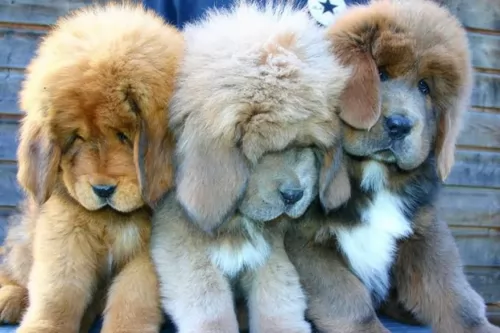 Bloat: Fatal unless treated immediately by a vet. Common to this size dog and can be controlled by eating habits.
Bloat: Fatal unless treated immediately by a vet. Common to this size dog and can be controlled by eating habits.
Other than these the Tibetan Kyi Apso is an ancient dog and very healthy as they were mostly isolated and did not interbreed. No genetic predetermined health problems.
 Your American Eskimo Dog needs a high quality food so they will not get overweight. Make sure you know how much is appropriate for your particular dog and her specific age. The puppies should be fed twice a day but adults only once.
Your American Eskimo Dog needs a high quality food so they will not get overweight. Make sure you know how much is appropriate for your particular dog and her specific age. The puppies should be fed twice a day but adults only once.
As previously mentioned the American Eskimo Dog is prone to eye issue such as Progressive Retinal Atrophy or (PRA) – this disease is inherited and used to cause blindness as the rods in the retina died. New medical discoveries mean this is no longer a hopeless disease. Their eyes are also susceptible to other issues so make sure you check them and the tear ducts regularly.
Like so many other breeds the American Eskimo is also susceptible to hip dysplasia and a moving patella in the knee. For this reason watch their weight. They can also be very allergic.
This small dog has more energy than his size can handle. He needs a lot of exercise and a place to run. If he will become hyperactive and destructive. They are prone to disturbing behaviors such as spinning (spinning in circles) when they don’t get enough exercise. The American Eskimo Dog is smart and agile, Play games like catch or agility. They are also great at herding, competitive obedience or detection.
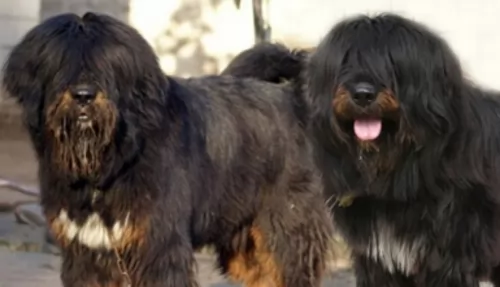 1Feeding the puppy – grow quickly don’t overfeed. High quality large breed puppy food and feed 4 small meals a day.
1Feeding the puppy – grow quickly don’t overfeed. High quality large breed puppy food and feed 4 small meals a day.
2.Feeding the adult – don’t over feed and don’t feed right before or after exercise due to the possibility of bloat. Feed high quality adult large breed dog food 2 x day in smaller meals.